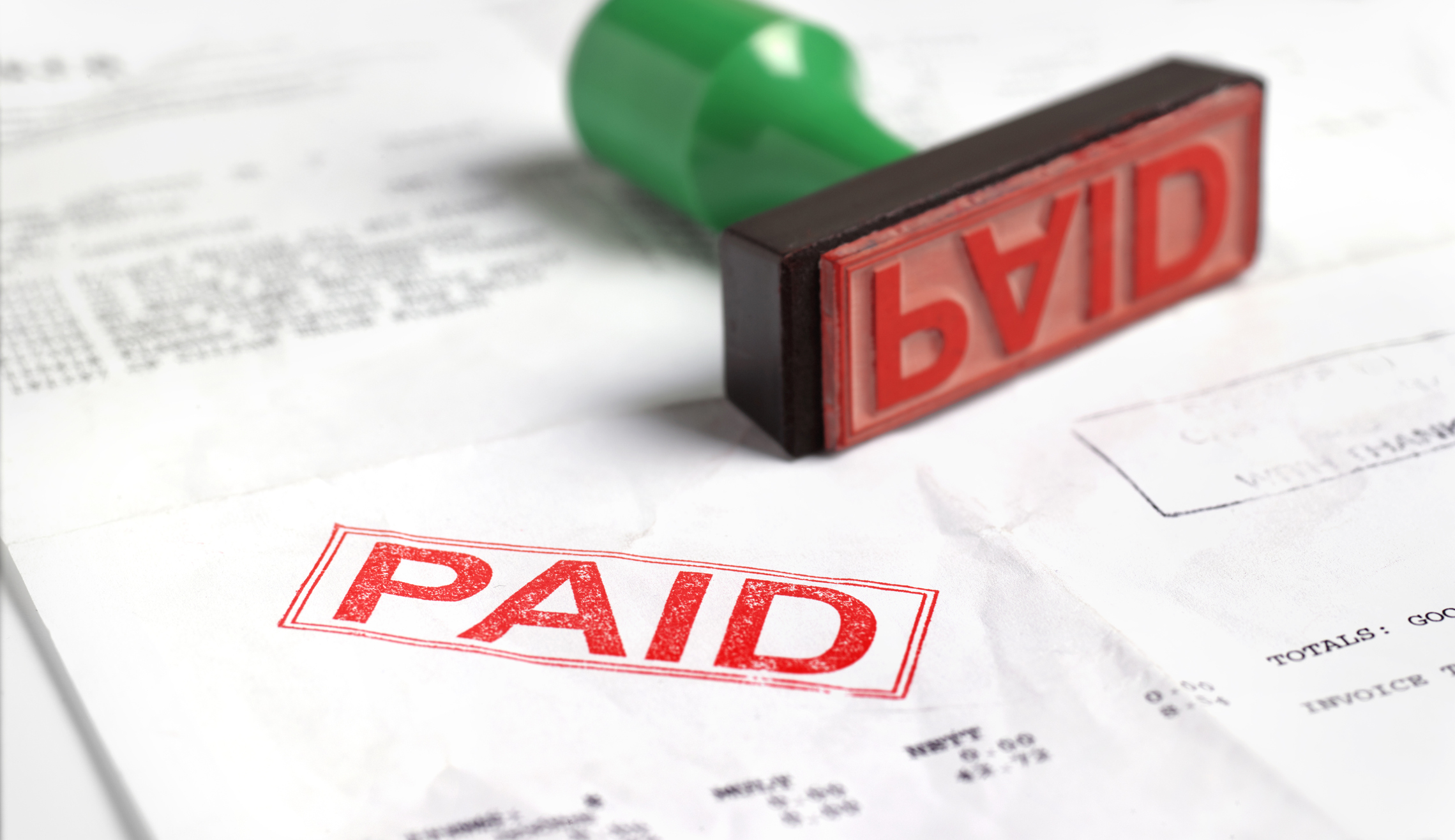How to pay off debts fast - 25 practical tips from finance experts
Whether you’ve built up a hefty overdraft or run up a big bill on your credit card that you can’t afford to pay off, we explore how to pay off debts fast

Need to know how to pay off debts fast? Whether you’ve built up a hefty overdraft or run up a big bill on your credit card that you can’t afford to pay off, follow these tips to become debt-free
Knowing how to pay off debts fast will be a high priority for those who might be pushed into borrowing with the cost-of-living crisis biting at most family budgets. Whether it's the increased energy price cap, or national insurance on the rise, millions of families are feeling the pinch. Even the most careful budgeters will know that it’s all too easy to get into debt - whether that’s going into your overdraft or running up a big bill on your credit card that you can’t afford to pay off.
“When your finances are spread thin it’s all too easy to put off paying off debts,” says Martyn James of consumer website Resolver. “But the most cost-effective thing you can do is clear what you owe, simply because debt interest and charges will only compound your debts the longer you leave them. You don’t have to clear everything in one go. But make a plan to get those debts cleared, one by one.”
How to pay off debts fast
1. Get organised
The first step to paying off debts is to get organised. After all the faster you can clear debt, the less interest you will pay. Set aside enough time to go through your debts and make a note of what you owe to who, what interest rate is being charged, and how many months left to pay. Then it’s time to make a plan on just how you’re going to become debt-free. Our tips below should help you on your way.
You might also benefit from creating a budget planner to keep all spending under control.
2. Focus on your biggest debt first
It makes financial sense to repay the most expensive debt first to reduce the number of interest payments you’re making as much as possible. “Having gone through your finances, you should have everything you need to work out what’s costing the most,” says Martyn James. “In other words, seeing what debts are charging the highest rate of interest.”
It’s likely to be your overdraft that is costing you the most, with typical interest rates at around 40% compared to a typical credit card rate of 20%. But it’s important to double-check the rate you’re being charged so you have all the accurate information to hand.
GoodtoKnow Newsletter
Parenting advice, hot topics, best buys and family finance tips delivered straight to your inbox.
Even though overdraft agreements don’t come with any set repayment plan – like you’d get for a personal loan, for example – you can create your own plan to repay in a number of regular instalments. Set yourself goals for each month to chip away at the debt.
With credit cards, you might be able to move to another card on an interest-free deal. Martyn James warns: “Check what the fee is for doing so, and how long you get versus what you can afford to pay off – so you make a big dent in the debt.”
Personal loans tend to charge much lower rates of interest so this might be last on your list. Plus there’s not usually the flexibility to overpay month to month. You might even be charged a fee for clearing it early. Make sure you check with your lender.
3. Move your overdraft to a 0% money transfer credit card
To clear an expensive overdraft fast, one option is to use a specialist money transfer credit card. It works by using the card to pay cash into your bank account. The cash clears your overdraft, so you owe the card instead, but at 0%. You then make monthly repayments to the credit card during the interest-free period, meaning that every penny you repay goes towards clearing the debt, and not towards bank charges. There is likely, however, to be an initial outlay for the transfer card in the form of a “handling fee” of 3-4% of the money you borrow. Look for cards that don’t come with a fee.
Find out more about how credit cards work with our handy beginner's guide.
4. Consider a low rate personal loan to pay off your debts
You could take out a personal loan to pay off your overdraft. With interest rates still relatively low, borrowing is pretty cheap with the best loan rates on offer at around 4%. Paying a lower interest rate will save you money in the long run, which means you can clear your overdraft faster and pay less interest to the bank. Don’t forget to compare loans to ensure you apply for the one with the cheapest rate.
5. Switch credit card debt to 0%
Balance transfer cards can help borrowers get debt under control. They offer the chance to switch debt built upon another card - where typically it will be charging around 21% - to a new card that offers zero interest for a set period.
Paying no interest at all means that every penny you repay goes towards paying off the debt, rather than going into the bank’s pockets. Some cards offer as much as 36 months interest-free. However, the longest interest-free deal might not be the most cost-effective, as these interest-free cards usually charge a fee each time you switch. Luckily, not all cards apply such a fee. Find the best deal at a comparison site such as moneyfacts.co.uk.
4. Track your progress with a weekly spreadsheet
Martyn John of Resolver suggests keeping a weekly spreadsheet or using an online app to monitor how you’re doing. He says: “It might seem helpless at first, but you’ll really feel like you’re making a difference when you see those debits come down.”
5. Look out for better deals - and switch if you can
Spend a day going through your bills and phone each supplier to see if you are eligible for better deals, discounts, freebies or trials. This might involve navigating lots of touchtone menus and call queues. But make a (large) pot of coffee and be patient. By the time you reach the bottom of the list – which will include the likes of Netflix, Amazon Prime and Disney+ TV streaming subscriptions, mobile phone, broadband and line rental– you should achieve some decent savings that can be put towards reducing debts.

6. Look out for duplicate payments
While you comb through your bank statements for savings to be made on bills, check on every direct debit registered to your account. Anti-virus software is a common one to forget about or double up on, according to Martyn James at Resolver. “When you buy a new laptop or desktop computer you will likely sign up for anti-virus software, without cancelling old ones, perhaps. We’ve seen people with a whole trail of annual subscriptions they’re paying for unnecessarily.”
7. Check automated card payments
Checking card payments – both debit and credit – is essential to spot any “continuous payment authority” commitments that could save you money. They differ from direct debits or standing orders and – unhelpfully - there is no list available of those you’ve signed up to. Payments made for a subscription service via this payment method are automatically renewed - usually annually – but you may have no paper (or email) trail of such a sign-up.
8. Get paid to spend with cashback cards
You can use a cashback credit card to pay for weekly spending. You earn a percentage on your spending and the money is typically credited to your card account once a year. Just make sure you repay every penny each month or it negates any benefit.
Search for the best cashback card on a comparison site such as moneyfacts.co.uk. You can also use cashback websites such as Topcashback.co.uk and Quidco.co.uk. Once logged on, you click on the links to retailers and start shopping. Each offers a different cashback percentage for assorted items. Just don’t overspend for the cashback - use just for things you’d be buying anyway.
9. Switch to a new bank account
Plenty of banks are offering cash rewards for switching your existing current account. First Direct and NatWest are paying £150 for new customers. At Nationwide you can earn £125 for moving your current account. Check for eligibility before you apply.
10. Be a babysitter
You can earn around £12 an hour for babysitting. You can spread the word locally or on social media and online such as yoopies.co.uk where you can register and advertise for free. Having a good set of references, experience, and being a parent (or grandparent) yourself will stand you in good favour. Having a DBS check will give you an added advantage. Earning extra money in your spare time can be a great solution when wondering how to pay off your debts fast.
11. Earn while you walk
Lockdown prompted many families to get a dog. Now getting back to the office, dog sitters and walkers are in demand. Register with an app such as Rover or Trusted House Sitters and make some money while on your daily walk. You can choose your own fees. Typically you could earn £10 or more per walk.
12. Sell your old items to raise some cash
If you haven't had a clear out for a while, see what you can find in your garage, spare room or loft space that’s worth selling. Sell on auction website eBay or Amazon Marketplace which allows you to sell second hand and new versions of an item already sold on its main site. You can also try cash-for-clutter website musicmagpie.co.uk, which takes smart phones, tablets, DVDs, CDs, games and electronics off your hands. Type in what you have to sell and get an instant price. You can direct proceeds to paying off debt. This is one of the easiest solutions when it comes to how to pay off debts fast.
13. Clear our your old sports gear
Use a specialist firm geared towards selling certain equipment you have upgraded or perhaps items for hobbies you may have given up. For example, golfbidder.co.uk will buy your golf clubs. Website camerajungle.co.uk does a similar job for those who want to sell photography equipment.
14. Get paid for taking part in surveys
Earn money for your opinion at survey websites. They can be about anything from tourism, food, media, shopping or public affairs and politics. Surveys often take 30 minutes. While some operate under a reward scheme where you earn points for surveys completed that can be exchanged for shopping vouchers, others pay cash – up to £15 per survey.
Check out surveycompare.net, crowdology.co.uk, yougov.co.uk and ipsos i-say.
Never pay to register and set up a new email address so your personal account doesn’t overload.
15. Be part of a focus group
Many market research companies pay well for your time at a focus group session. You can earn anything between £10 to £350 for offering your point of view on the chosen subject which can be anything from bank accounts to holidays. Some projects may involve product testing. You can also opt for Amazon or shopping vouchers. Visit paidfocusgroup.co.uk where registration is free.

16. Get paid to recycle and reduce debt
Dig out old phones and sell them online at websites such as envirofone or mazuma. You can also part exchange them for a new one with some retailers. Some websites even pay cash for empty printer cartridges. Take a look at cashforcartridges. As most households have several old mobile phones that are no longer used, this is a great solution when it comes to how to pay off debts fast.
17. Reunite with lost prizes
Premium Bond prizes worth a combined £74 million remain unclaimed, according to the latest figures from National Savings and Investments (NS&I). You can check to see if you’ve won by using the online prize checker as long as you know your holder number. If you’ve lost all documents NS&I can trace them for you.
18. Refer a friend
Rewards for referring friends to retailers are a very simple way to earn money. Many offer credit off your next spend but there are some websites that pay actual cash. For example, Topcashback.co.uk, pays out for referring mates. Members get £25 referral bonus once the friend has earned more than £10 cashback. There are plenty of retailers that have a referral reward scheme. Check with those you already shop with.
19. WFH? Get £125 back from the taxman
If you've worked at home for even one day over the last year because of Covid, then you could be entitled to £125 back from HM Revenue & Customs. The relief is to cover extra costs incurred such as higher heating, electricity and internet bills. Check if you are eligible and to make a claim here.
If you do claim yourself, how much you will get depends on the rate of income tax you pay. You can backdate your claim for up to the last four tax years, as long as you qualify.
20. Claim money-saving grants
You might be able to save money on soaring energy bills by making your home more energy efficient. Find out if you’re eligible for a home energy grant to help pay for things like loft and cavity wall insulation.
21. Check benefits
Millions of people are missing out on around £15 billion of unclaimed benefits, at the last count. This includes housing benefit, income support or income-related employment and support allowance (ESA), which increases the risk of individuals being pushed into financial hardship.
Anyone on a low income needs to regularly check that they’re getting all the help available to them. Search at turn2us.org.uk to ascertain what benefits you might be eligible for.
22. Check your tax code
If over the past four years you have been issued the wrong tax code you may be due an income tax rebate. Every year, millions of people pay too much tax. Find your tax code on your payslip and use an online checker such as the one on MoneySavingExpert. Brace yourself just in case you find you owe the taxman rather than being owed.
23. It pays to talk
If you’re struggling, speak to the card or loan company and ask what help they can offer you while you get back on your feet. If they refuse to help, or make the situation worse, you may be able to complain to the Financial Ombudsman - for free.
24. Avoid payday loans
Payday loans are an expensive way to borrow - and are never a good solution when it comes to how to pay off debts fast. They were designed to tide people over until payday but if you use them regularly and can’t pay on time, the charges, and debt, can spiral out of control. Avoid them at all costs.
25. Know when to get help for your debts
If you are unable to repay debts and even borrowing more to make repayments, it’s time to speak to a professional. Getting help from a debt charity is free and they can go through your finances and advise you on the best path on how to pay off debts fast. They can also deal with the bank on your behalf in some cases, sometimes getting them to freeze interest charges. Try Stepchange.org or Nationaldebtline.org.
Video of the week:
-
 How to save money: 28 family-friendly money-saving tips for mums and dads
How to save money: 28 family-friendly money-saving tips for mums and dadsUnderstanding how to save money is key to limiting the impact of rising costs as much as possible
By Sarah Handley Published
-
 14 hidden benefits of your Amazon Prime membership
14 hidden benefits of your Amazon Prime membershipWe reveal the less-obvious perks of a Prime membership that will help you get the most value out of your subscription fee
By Rachel Wait Published
-
 14 surprising ways to spend your Tesco Clubcard vouchers - from restaurants and cinema passes to mini breaks and Disney+
14 surprising ways to spend your Tesco Clubcard vouchers - from restaurants and cinema passes to mini breaks and Disney+Tesco Clubcard vouchers can help you cut the cost of everything from groceries and travel to days out and cinema tickets
By Heidi Scrimgeour Published
-
 How to get Disney+ for free and save up to £79.90 a year
How to get Disney+ for free and save up to £79.90 a yearEven though the streaming giant ended its free trial offering, there are still multiple ways you can get Disney+ for free for up to 12 months
By Sarah Handley Published
-
 Parents of teens who have just taken their GCSEs urged to check child benefit status ahead of August deadline
Parents of teens who have just taken their GCSEs urged to check child benefit status ahead of August deadlineWith a child benefit deadline looming, some parents could see their payments reduced or stopped altogether - here's why
By Sarah Handley Published
-
 Parents should hold off buying this back to school staple 'as close to their first day as possible', says retailer
Parents should hold off buying this back to school staple 'as close to their first day as possible', says retailerWith parents turning their attention to kitting their kids out for the new school year, research suggestions which items should be left until the last minute
By Sarah Handley Published
-
 7 ways to save on back to school essentials, as its revealed parents will spend £2.3 billion in 2024
7 ways to save on back to school essentials, as its revealed parents will spend £2.3 billion in 2024We share ways you can get your child all the bits and bobs they need for the new school year, without breaking the bank
By Sarah Handley Published
-
 What day is child benefit paid around the bank holiday? Everything parents need to know
What day is child benefit paid around the bank holiday? Everything parents need to knowKnowing which day child benefit is paid when it comes to the bank holiday can help families plan their budgets accordingly
By Sarah Handley Published